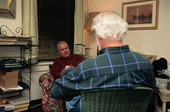- Double Mastectomy May Offer No Survival Benefit to Women With Breast Cancer
- Toxic Lead Found in Cinnamon Product, FDA Says
- Certain Abbott Blood Sugar Monitors May Give Incorrect Readings
- Athletes Can Expect High Ozone, Pollen Counts for Paris Olympics
- Fake Oxycontin Pills Widespread and Potentially Deadly: Report
- Shingles Vaccine Could Lower Dementia Risk
- Your Odds for Accidental Gun Death Rise Greatly in Certain States
- Kids From Poorer Families Less Likely to Survive Cancer
- Tough Workouts Won’t Trigger Cardiac Arrest in Folks With Long QT Syndrome
- At-Home Colon Cancer Test Can Save Lives
Counselors Give Smokers Best Chance to Quit: Study


Smokers who work with a counselor specially trained to help them quit — along with using medications or nicotine patches or gum — are three times more likely to kick the habit than smokers who try to quit without any help, a large new study finds.
Over-the-counter nicotine-replacement products have become more popular than smoking cessation services and are used by millions of smokers, the researchers pointed out. However, these products alone do not appear to improve the odds that smokers will actually quit, they found.
They used information compiled in a survey of smokers and former smokers to examine the effectiveness of services to help people stop smoking offered by the U.K.’s National Health Service (NHS). They analyzed the success of 10,000 people living in England who tried to quit smoking in the past year.
The study, published online in Dec. 20 in the journal Addiction, revealed that smokers who used smoking cessation services have the best chance of quitting successfully. The researchers also found that smokers who use nicotine-replacement products to stop smoking without the help of a trained health professional are no more likely to quit than smokers who try to stop smoking without using any products or medication.
“When you think that stopping smoking saves six hours of life for every day of smoking avoided, investing an hour or two over a six-week period to see an NHS stop-smoking advisor seems like a good investment,” study leader Robert West, a professor at University College London, said in a journal news release. “They can provide cheaper medicine than is available in shops and advise how to use it properly.”
“It’s crazy that not all smokers who want to stop do it,” West added. “As far as nicotine products bought from shops are concerned, there is an urgent need to understand what is going on because we know that if these products are used properly they can be effective.”
More information
Visit the U.S. Centers for Disease Control and Prevention to learn more about how to quit smoking.
Source: HealthDay
Copyright © 2024 HealthDay. All rights reserved.










